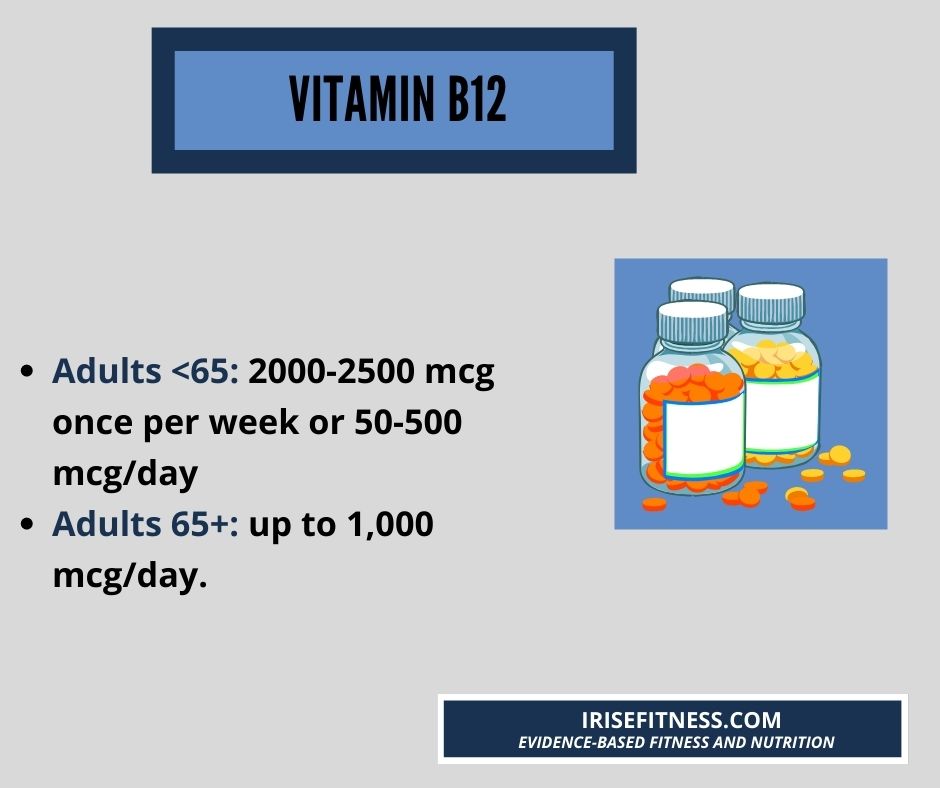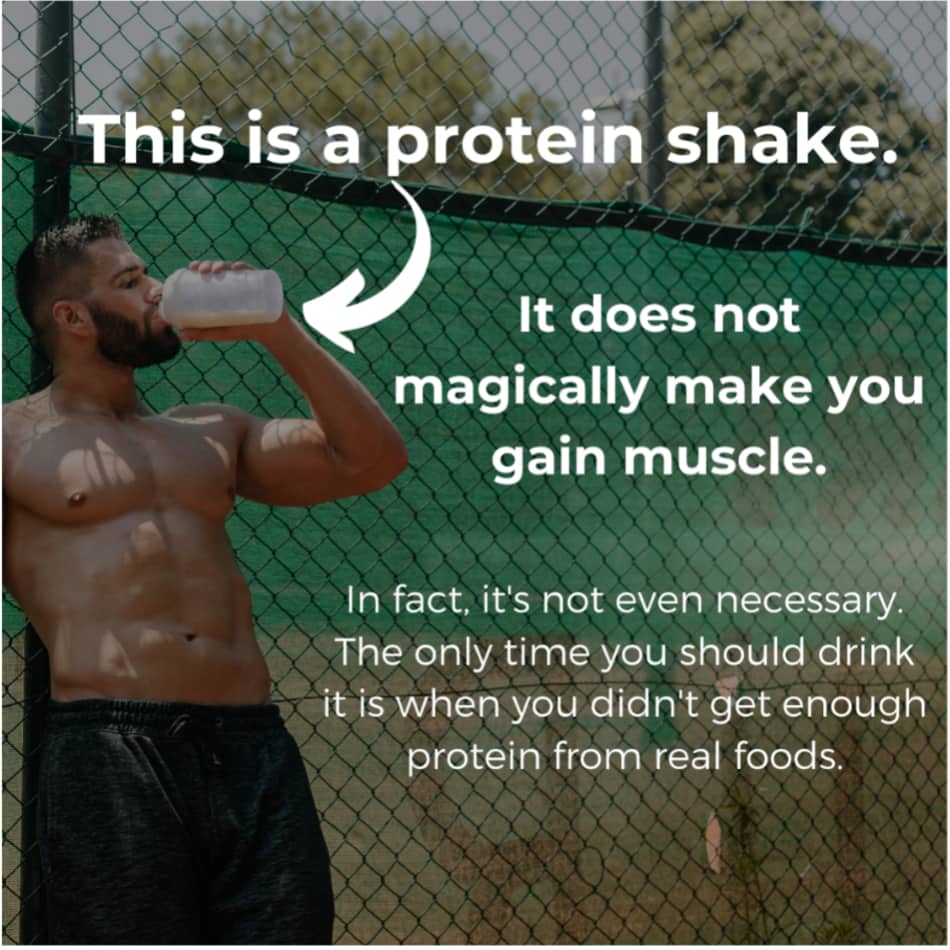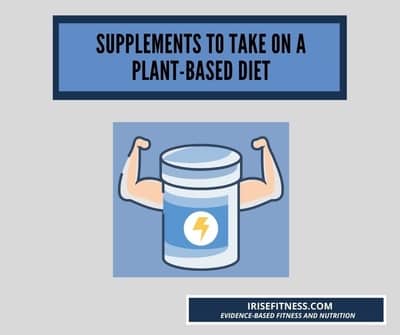
Eating a plant-based or vegan diet is often thought of as a diet that requires “a whole bunch of supplementation due to nutrient deficiencies.”
This couldn’t be further from the truth.
While you can essentially get all your vitamins and minerals through a plant-based diet, there is one supplement you need to be taking and a couple others you can consider taking to ensure you cover your basis.
I will cover 5 supplements: The first three/four options will be related to nutrition and the last one/two options will be related to exercise and muscle growth.
Vitamin B12
I want to preface by saying that vitamin B12 is the only supplement on the list that cannot be argued because you will not get enough B12 on a plant-based diet. All other supplements I talk about can be obtained through diet/sun, but might be helpful to supplement.
What is Vitamin B12 and Where Does it Come From?
Vitamin B12 comes from microbes and is very important for various functions, such as helping to make your DNA and red blood cells.
Vitamin B12 is not made by plants, nor animals. It is actually made by microbes that blanket the earth. We used to get enough B12 by eating food from the ground and drinking water from streams as that water/food contained trace amounts of bacteria. But in today’s modern, sanitized world, we chlorinate our water to kill off bacteria. It is a good thing because we don’t get much cholera, but as a result, nor do we get enough B12.
Why Do Some Animal Products Contain B12?
While vitamin B12 is found in some animal products (beef, fish, eggs, etc.) as I mentioned above, it is not made by the animal. The reason some meat contains B12 is because when animals eat from the ground, they eat trace amounts of B12.
That being said, more and more, animals are not eating from the ground, but instead, eating processed grains and other foods. For this reason, many animals are now being supplemented with B12 themselves and even if you eat animal products, you should consider supplementing with B12 (especially if you don’t eat too much meat) because roughly 1/3rd of people who do consume animal products are also deficient in B12.
So if the animal isn’t making the B12 itself, why not skip the “middleman” and just supplement considering it’s very inexpensive and easy?
Which B12 Supplement Should You Take and How Much?
For adults under the age of 65, I recommend supplementing with about 250 mcg of a cyanocobalamin spray per day. However, if you don’t like the idea of taking it every day or you’re afraid you’ll forget, you can take a tablet of 2500 mcg once per week or get B12 injections from your doctor. Adults 65+ might be able to benefit from as much as 1,000 mcg per day so always consult your doctor about what might be the right dosage for you.
You can get supplementation through fortified foods, such as various plant milks (look at the nutrition facts to make sure there is B12) or nutritional yeast, but to ensure you are consistent, it’s worth taking a supplement seeing as it’s very inexpensive and the benefits outweigh the risks.
To ensure you are keeping your levels up, I recommend getting periodical blood tests done. If you choose to do this, just know that methylmalonic acid (MMA), and homocysteine (Hcy) are better markers for B12 sufficiency compared to serum B12.

Omega-3s
Omega-3 fatty acids are important fats that provide many health benefits. There are 3 types of omega-3s: ALA, DHA, and EPA.
Most people think of getting omega-3s from fatty fish, such as salmon. However, omega-3 fatty acids are plant derived fats that come from algae in the ocean. If you get omega-3s from fish, it isn’t the fish that is making it – the fish are eating other creatures that eat the algae that contains the omega-3s.
The problem with getting your omega-3s strictly from fish and seafood is that they tend to be sponges for toxins within our oceans. Research clearly shows that fish contain high levels of pollutants and are among the major source of exposure humans have to Persistent Organic Pollutants (POPs), which are essentially toxic chemicals within our environment.
Looking for plant-based sources of omega 3’s?
The top sources are flax seeds, chia seeds, hemp seeds, walnuts, and soybeans. These are plant-based foods that contain ALA.
1.5 tablespoons of chia/ground flaxseeds each day is sufficient as your body will take the ALA and create all the EPA and DHA that you need.
You can also take an algae oil supplement daily, which is better than fish oil as fish oil supplements have been found to be contaminated with PCBs and other pollutants. So if you are going to supplement, I would stick to algae oil.
In terms of omega-3s, I would make sure you eat at least one tablespoon of flax seeds, chia seeds (make sure they’re ground as that helps absorption), or hemp seeds per day, or supplement with 250-1000 mg of algae oil each day.

Vitamin D3
Vitamin D3 is known as the “sunshine” vitamin, aids in the absorption of calcium, helping to maintain strong bones. It also helps maintain normal levels of phosphorus, in addition to supporting our immune function and heart health.
Considering the fact that not many foods contain vitamin D, it is recommended to get 15-20 minutes of sun exposure daily to exposed skin during the summer months.
That said, many of us live in climates that have winter months with limited sunshine, in which case during that time, it is recommended to get your daily dose of vitamin D from either fortified foods, such as plant milks or from a supplement.
If you are relying on Vitamin D from fortified foods, make sure you check the nutrition facts to ensure you are getting the amount you need.
If you choose to supplement vitamin D, for the average person, I recommend taking 50 mcg/day (2000 IU/day).

Protein Powder
Should you supplement with a protein powder?
There’s nothing magical about protein shakes – it’s just a quick and easy way to get more protein in your diet.
Use them if you’re having trouble hitting your protein goals from real food. Don’t use them if you get enough protein from real food.
I personally use a protein powder because it’s convenient and helps me reach my daily protein intake.
Here are some good brands for plant-based protein powders:
- Vivolife
- Vedge Nutrition
- NOW Sports Pea Protein Powder (cheapest, tastes bad, but not really noticeable in smoothies)
- Orgain
- Vega
When looking for a protein powder, make sure to check the ingredients list carefully. You want to stay away from products that contain high amounts of added sugars, artificial sweeteners, flavors, fillers, and preservatives.
Additionally, you should consider whether the product has undergone third-party testing from organizations like NSF or Informed-Choice. This helps to ensure the products actually are what they say they are and don’t contain harmful ingredients, such as heavy metals.

Creatine
The only other fitness supplement I take is creatine.
Creatine is a tripeptide consisting of three amino acids. While our bodies produce some of it naturally and it is also found in meat, such as beef, neither of those two ways provide your body the full physique enhancing effects.
What creatine does is essentially allow the body to regenerate ATP faster, providing you with an increase in power output in the gym that allows you to get a couple extra repetitions, therefore improving strength gains.
Is Creatine Effective?
Creatine is incredibly effective from a performance and physique enhancing standpoint. There is a large body of research, unlike many supplements, that supports the efficacy of creatine.
For example, this 2003 review study examining 300 studies found that participants showed a 5-15% increase in maximal strength and power with creatine supplementation.
Is Creatine Safe?
Creatine is one supplement (unlike the vast majority of them)) that actually has a great deal of research supporting its safety.
This study, for example, studied people who used creatine up to four years and no adverse health effects were found.
What is the Best Type of Creatine?
While there are many types of creatine on the market, stick with creatine monohydrate. As this review paper suggests, there is no evidence to date that other forms of creatine are more effective than creatine monohydrate.
How Should You Take Creatine?
When it comes to taking creatine, there’s 2 different options to choose from. You can “load” it with around 20 grams per day for 5-7 days, which has been shown to saturate your creatine stores. From there, you should take 3-5 grams per day to maintain elevated creatine stores.
The other/easier option is to not “load” the creatine, but rather take 3-5 grams of creatine per day from the start, which has been shown through research to be equally as effective, it just takes a couple weeks longer to reach the same effect.
Conclusion
In conclusion, while a plant-based diet is extremely nutritious and requires minimal supplementation, make sure you do supplement with B12. That is the only non-negotiable.
Vitamin D3 should be taken if you’re not able to get 15-20 minutes of direct sunlight exposure during summer months.
Omega-3s can be obtained with either 1.5 tbsp of flax or chia seeds. You can supplement with algae oil to be safe if you want.
Protein powder can be used if you’re strength training and want to increase your protein consumption.
Creatine can be used by anyone (regardless of age or gender) if you’re looking to increase strength and power.
I hope you enjoyed reading this article and that you learned something new. If you have any questions, feel free to comment down below, message me through my website, or follow me on Facebook at https://www.facebook.com/devin.mcnamara.77!
Disclaimer
This information is intended for healthy individuals. Before beginning to implement any dietary changes, you should have a discussion with your doctor or licensed healthcare provider.
The information within this article is not intended to replace medical treatment or advice. This information is not intended to treat any illness or disease. Rather, as a nutritional guide, this information is for educational purposes only and is not intended to replace medical care or advice as part of a healthy lifestyle. If you choose not to obtain the consent of your physician and/or work with your physician before implementing information learned in this article, you are agreeing to accept full responsibility for your actions. Not all people respond to food the same way, so if you experience difficulty with digestion, allergic reaction, or any other issues, please consult your doctor or licensed healthcare provider.

